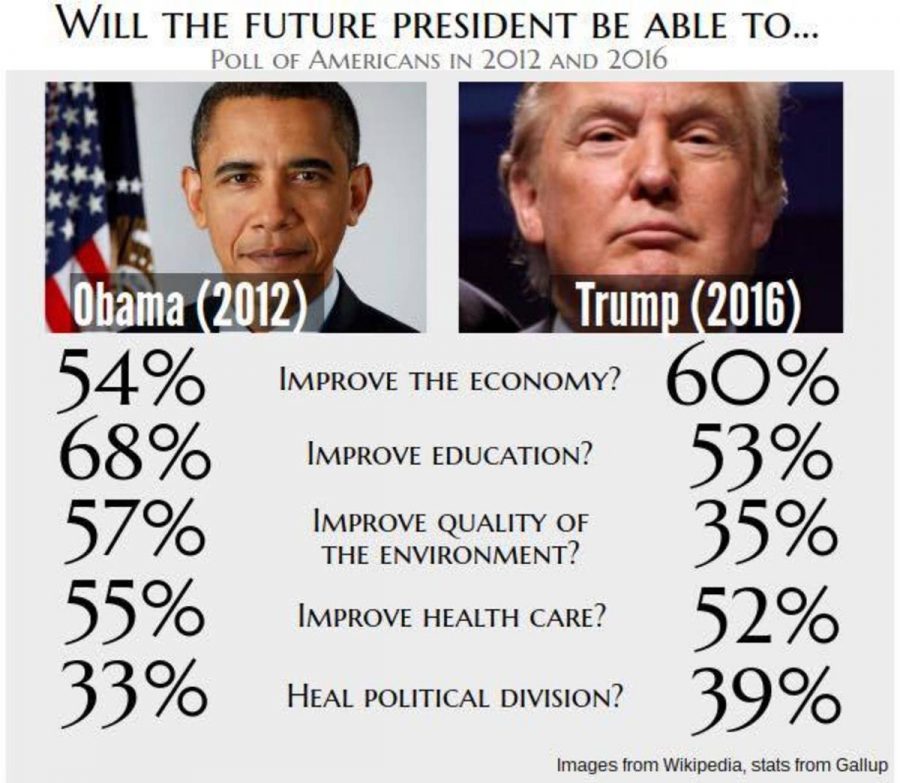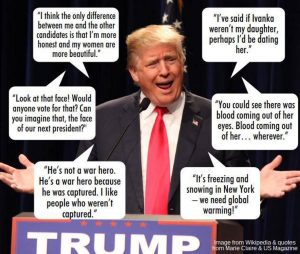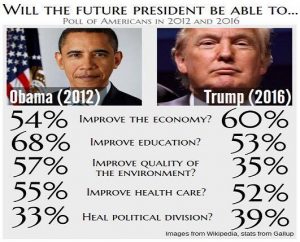America is still great, even with President Trump
December 5, 2016
“I’ve just received a call from Secretary Clinton,” Donald Trump said over the cheers of a supportive crowd. The election was finally over; Hillary Clinton had conceded. For many, that moment was the beginning of the end of the world. But for me, it was the moment that I truly believed—even amidst shock and sadness—that it would be alright.
I’m a woman, a Mexican, and the granddaughter of immigrants. Even though the president-elect has demeaned so many parts of my identity, I still believe in our democracy, our Constitution and our nation’s future.
The Constitution protects the nation’s core values and principles: freedom of speech, religion, the press, association, justice and due process, equality under law, the right to vote and the peaceful transition of power according to those results. These values are contained in one all-important document; violating one, such as abusing the electoral college or preventing the peaceful transition of power, opens the door for violations to all. Clinton’s early morning phone call was the first step in ensuring each of those values is respected.
The Supreme Court—even if it is tipped conservative by a Trump-appointee—is bound to the Constitution. Only so much can be altered; the rule of precedent applies to most cases that have been ruled on by previous courts. Reversing precedents is rare, and for this to occur, another case of the same nature must come before the Court.
The Supreme Court might not even be tipped conservative; the Republicans don’t have a sixty-senator majority. Before a confirmation vote can proceed, nine democratic or independent senators must join the 51 Republican senators in a vote to end debates on the nominee—unless Trump nominates a more moderate candidate, this seems unlikely.
This is checks and balances at work; the Senate is a check on the president’s power, and the Republican’s slim majority—51 to 47, with two independents—doesn’t nullify this. Checks and balances in the legislative arena will also moderate Trump’s radical policies. Speaker of the House of Representatives Paul Ryan still doesn’t agree with Trump on a number of key issues, despite his seemingly reluctant endorsement.
The world isn’t ending, even if it’s changing.
Ryan supports legal status for some undocumented immigrants, not mass deportation of millions at a time. He has put forth plans for a balanced budget—not the $24.5 trillion of debt that some experts claim Trump’s policies will cause. In June, Ryan criticized Trump’s stance on a ban on Muslim immigrants; “Muslims are our partners,” he said at a press conference. He also condemned Trump’s racist remarks against Indiana-born judge of Mexican descent, Gonzalo Curiel.
The Democrats have power in the minority, too. In the Senate, the filibuster exists to allow the minority to halt radical legislation; Republicans don’t have the 60 votes necessary to achieve cloture, which ends a legislative filibuster. In addition, filibusters draw significant media attention to the Democratic agenda. Some Republicans have talked of a vote to end the filibuster, but this move seems unlikely—ending the filibuster would jeopardize Republican interests if they were to become the minority party, removing their ability to halt Democratic legislation.
The area of government with the fewest checks and balances is foreign policy; it’s also the area in which Trump seems to have the least expertise. Although Trump will be the commander in chief and chief diplomat, he will be surrounded by national security experts and his actions will be constrained by international law. In January, Retired Air Force General Michael Hayden said many members of the military would refuse to act if Trump ordered the killing of the families’ of terrorists; international law would be on their side.
The damage Donald Trump can do is limited. Don’t get me wrong, it’s okay to feel afraid, angry and dismayed. These feelings are valid, important and powerful. They will be most powerful when channeled into productive action.
From calls for solidarity and unity to plans for the next midterm elections, the social media response—by voters, millennials, and all those feeling threatened by a Trump presidency—has been heartening and another sign of our democracy’s health and stability.
Our nation’s founding principles and democratic institutions are far stronger than a single person, even Donald Trump. The world isn’t ending, even if it’s changing.
On Wednesday morning, during second period, I turned to the flag and spoke the pledge of allegiance: “I pledge allegiance to the flag of the United States of America, and to the Republic for which it stands, one Nation under God, indivisible, with liberty and justice for all.”
I truly believe that our nation will remain a model for liberty and justice; we cannot allow this election to divide us. We are stronger together.














Student • Dec 5, 2016 at 7:50 pm
Both stories flow from the perspective that Trump is terrible. Could you not get an actual Republican on the staff to write a third column about how Trump could improve the country? Of course not because that goes against the cardinal rule of only espousing liberal opinions.